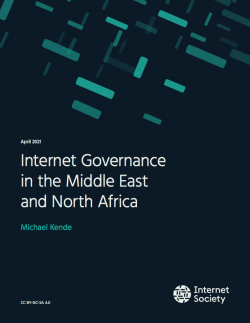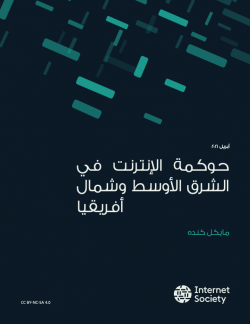Author: Michael Kende
Author would like to thank Nermine El Saadany for her leadership and Hana Sabbagh and Hanna Kreitem for their support in the region, and Katie Watson Jordan, Konstantinos Komaitis, Andrew Robachevsky and Carl Gahnberg for their work on the Internet Way of Networking project and input on this report. Members of the Internet Society Community in the region also provided input on country characteristics.
Introduction
The Internet is a ‘network of networks’ made up of tens of thousands of networks that interconnect and route traffic efficiently between end points. While the interconnections and routing of traffic are intrinsically borderless, the decisions of national governments can impact key properties of the Internet. As the Internet began to develop and grow, governance mechanisms also began to develop. As it then globalized, different countries and regions have adopted it and brought new approaches to governance, reflecting their traditions, economies, and societies. This paper focuses on the Internet’s governance in the Middle East and North Africa (MENA).
The vitality of the Internet and the critical need to further develop and expand it has been highlighted during the pandemic. Efforts to curb COVID-19 through stay-at-home orders around the world left everything and everyone almost frozen in place. The Internet helped maintain business continuity, government services, education, and social lives. The MENA region, like all others, saw quick uptake in usage, and a number of governments adopted supportive policies to help Internet Service Providers (ISPs) and content providers to serve this demand. However, the response also highlighted remaining gaps in adoption and access to valuable content and services.
In order to meet the goal of increased Internet availability and adoption, the Internet Society has a paper entitled A policy framework for enabling Internet access. The framework outlines three linked areas which, together, will advance access: Expanding Infrastructure; Supportive Governance; and Fostering Skills and Entrepreneurship. These three areas ensure that the Internet is available and resilient, that users have digital skills and the ability to produce and not just consume content and services, and the governance to enable this growth of the Internet.
The Internet Society established a Middle East Bureau in 2016 to better support regional efforts to develop the Internet. It recently released a paper, Middle East & North Africa Internet Infrastructure Report, that focuses on the first linked area of the policy framework, ‘Expanding infrastructure’. This paper focuses on the second area, ‘Supportive Governance’, and a future paper will focus on the final area, ‘Fostering Skills and Entrepreneurship’.
Supportive governance should aim to promote the qualities of the Internet that have led to its success. As the Internet has grown exponentially in adoption and usage, it has transformed our lives and societies for the better. The Internet owes this impact to the strength and resilience built into its open architecture, embodied in a number of critical properties, which the Internet Society has identified and defined as the Internet Way of Networking. These properties can be impacted by a country’s policies and regulations, and this paper assesses the impact of those policies and regulations on the Internet Way of Networking as applied to the MENA region.

